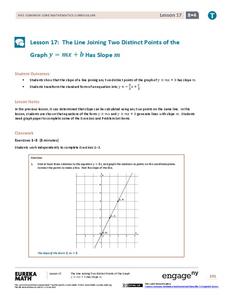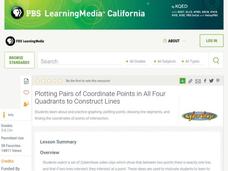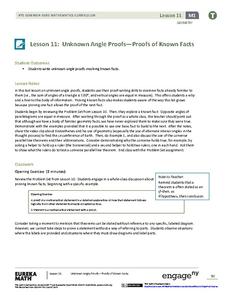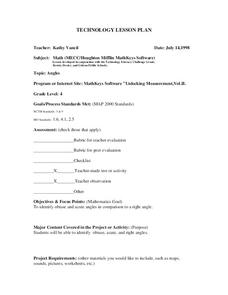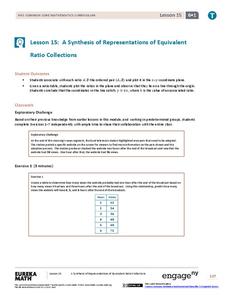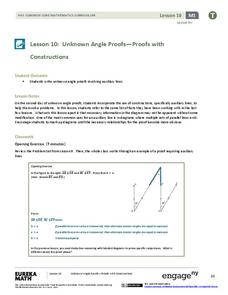EngageNY
The Line Joining Two Distinct Points of the Graph y=mx+b Has Slope m
Investigate the relationship between the slope-intercept form and the slope of the graph. The lesson plan leads an investigation of the slope-intercept equation of a line and its slope. Pupils realize the slope is the same as the...
EngageNY
Characteristics of Parallel Lines
Systems of parallel lines have no solution. Pupils work examples to discover that lines with the same slope and different y-intercepts are parallel. The 27th segment of 33 uses this discovery to develop a proof, and the class determines...
PBS
Plotting Pairs of Coordinate Points in All Four Quadrants to Construct Lines
Your young graphers are motivated by watching three Cyberchase videos to plot points in all four quadrants, connect pairs of points to make a line segment, and find the point of intersection of two lines.
Virginia Department of Education
Angles, Arcs, and Segments in Circles
Investigate relationships between angles, arcs, and segments in circles. Pupils use geometry software to discover the relationships between angles, arcs, and segments associated with circles. Class members use similar triangles to...
EngageNY
The Graph of a Linear Equation in Two Variables Is a Line
Show your class that linear equations produce graphs of lines. The 20th segment in a unit of 33 provides proof that the graph of a two-variable linear equation is a line. Scholars graph linear equations using two points, either from...
EngageNY
From Ratio Tables, Equations and Double Number Line Diagrams to Plots on the Coordinate Plane
Represent ratios using a variety of methods. Classmates combine the representations of ratios previously learned with the coordinate plane. Using ratio tables, equations, double number lines, and ordered pairs to represent...
EngageNY
Fundamental Theorem of Similarity (FTS)
How do dilated line segments relate? Lead the class in an activity to determine the relationship between line segments and their dilated images. In the fourth section in a unit of 16, pupils discover the dilated line...
Geometry Accelerated
Accelerated Geometry Review Sheet
Your geometry learners use their knowledge of various geometric concepts to write proofs. Starting with givens containing parallel line segments with transversals and triangles and quadrilaterals, and the mid-point and distance formulas;...
EngageNY
Properties of Dilations
Investigate dilations to learn more about them. The second segment in a series of 16 provides a discussion of properties of dilations by going through examples. The problem set provides opportunities for scholars to construct dilations.
EngageNY
Finding One Hundred Percent Given Another Percent
Class members solve problems to find the whole when given a percent. They use double line numbers and factors of hundred to help break the 100 percent into equal segments.
EngageNY
Informal Proofs of Properties of Dilations
Challenge the class to prove that the dilation properties always hold. The lesson develops an informal proof of the properties of dilations through a discussion. Two of the proofs are verified with each class member performing the...
EngageNY
Distance and Complex Numbers 2
Classmates apply midpoint concepts by leapfrogging around the complex plane. The 12th lesson in a 32 segment unit, asks pupils to apply distances and midpoints in relationship to two complex numbers. The class develops a formula to find...
EngageNY
Unknown Angle Proofs—Proofs of Known Facts
Lead the class in a Greek history lesson with a geometric twist. Pupils relate a short video about geometric properties to modern-day methods of solving for unknown angles. They discuss parallel line theorems and complete...
EngageNY
Interpreting and Computing Division of a Fraction by a Fraction—More Models
Use a unit approach in developing a fraction division strategy. The teacher leads a discussion on division containing units, resulting in a connection between the units and like denominators. Pupils develop a rule in dividing fractions...
Shakespeare Uncovered
Women’s Roles in As You Like It
“There is nothing that becommeth a maid better than soberness, silence, shamefastness, and chastity, both of body & mind.” This line, from Thomas Bentley ‘s The Monument of Matrons published in 1582, typifies the way women were...
Shakespeare Uncovered
“Speak, I Charge You”: Macbeth On Your Feet, Not In Your Seat
“Is this a dagger which I see before me . . .” As part of a study of Macbeth, class members engage in a series of activities that get them up and moving. Individuals practice, then deliver, a line from the Scottish play. The entire class...
Shakespeare Uncovered
All the Globe’s a Stage: Shakespeare’s Theatre
“All the world’s a stage,” exclaims Jaques in As You Like It, but it is the structure of the Globe stage and how that structure influenced Shakespeare’s plays that is the focus of an on-line research project. Class members visit a series...
Curated OER
Transformations in the Coordinate Plane
Your learners connect the new concepts of transformations in the coordinate plane to their previous knowledge using the solid vocabulary development in this unit. Like a foreign language, mathematics has its own set of vocabulary terms...
Illustrative Mathematics
Points equidistant from two points in the plane
Young geometers apply their deductive reasoning skills and knowledge of proving triangles congruent in a task that asks them to prove if a point lies on the perpendicular bisector of a segment, then it is equidistant from the endpoints...
Curated OER
Angles
Learners identify obtuse and acute angles in comparsion to a right angle. They identify obtuse, acute, and right angles. Pupils use "Shape Measure" to construct obtuse, acute, and right angles. They review line segements to locate right...
EngageNY
Construct a Perpendicular Bisector
How hard can it be to split something in half? Learners investigate how previously learned concepts from angle bisectors can be used to develop ways to construct perpendicular bisectors. The resource also covers constructing a...
EngageNY
A Synthesis of Representations of Equivalent Ratio Collections
Make all the ratio representations fit together. The 15th segment in a series of 29 presents ratio problems to solve. Scholars use a variety of representations to respond to the questions. The problem set has pupils show how the...
Curated OER
Reflections and Equilateral Triangles II
Given the lines of symmetry in an equilateral triangle, your learners find where the pre-image vertices are mapped onto the new image. They explore the properties of equilateral triangles, the impact of reflections, and the...
EngageNY
Unknown Angle Proofs—Proofs with Constructions
Provide your emerging mathematicians with the tools to learn as they incorporate auxiliary lines to solve unknown angle proofs in this continuing segment. They decipher information from a diagram to uncover the missing pieces and...
Other popular searches
- Geometry Lines Line Segments
- Line Segments Rays
- Congruent Line Segments
- Points, Lines, Line Segments
- Points Lines Line Segments
- Geometry Line Segments
- Identifying Line Segments
- Measuring Line Segments
- Lines Line Segments Rays
- Distance of Line Segments
- Parallel Line Segments
- Corresponding Line Segments
